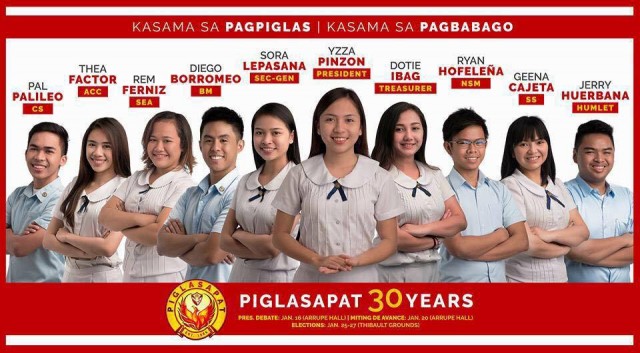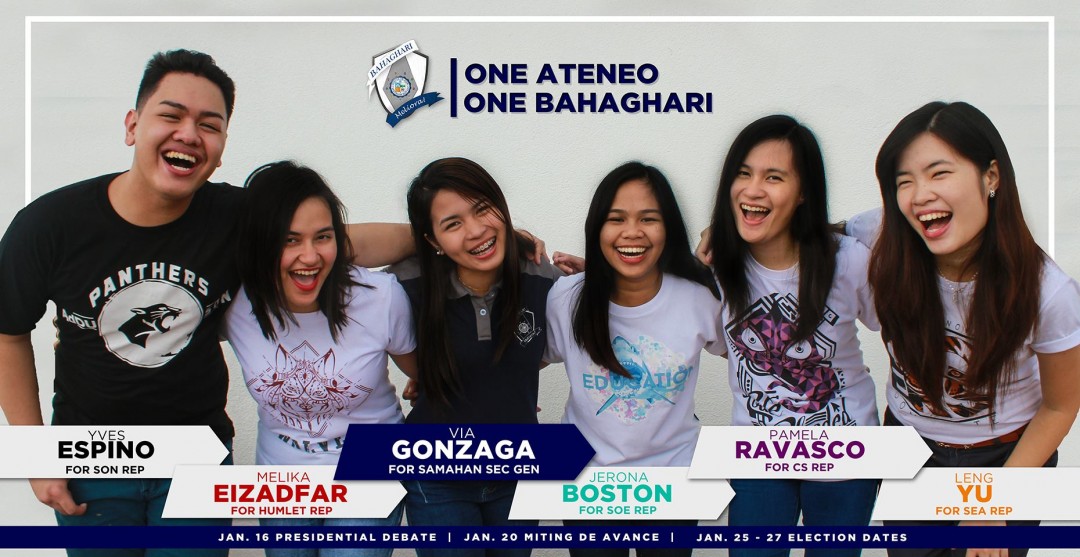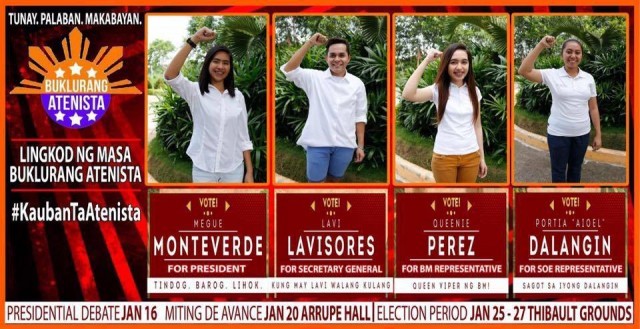Unlike the conventional common stereotype of politicians in the country, student leaders are seen less cynical in the political arena. Even in the political parties, politicians are highly demeaned as criticisms like trapo, biased, and gasgas go overboard, while the masses continue the outcry for more mechanisms to change these frustrating acts especially that these political actors are the reflections of the country’s entire image.
Meanwhile, the challenge for student leadership dedicated to a “common good through careful cultivation of appropriate ideals, virtues and leadership skills” was purported by one of the inspiring addresses of University Pres. Joel Tabora, SJ in a Joint Faculty Convocation last June 2012 calling for more leaders with the spirit of sui generis.
For a number of years, the three dominating political parties which have been established in Ateneo de Davao University namely Bahaghari, Buklurang Atenista and Piglasapat continue to prove their worth of the sui generis leadership by struggling to fight for social justice and reform for the betterment of the student body.
Despite the advocacies they try to espouse, do these political parties heavily contribute to the change every student envisions? Or are they just becoming more self-serving during the election period while putting the students’ concerns on the side of the table and use it only when they can benefit from it?
Politics of convenience
Amid the rising students’ concerns which were emphasized in the last Presidential Debates 2017, including the unnecessary colored lights installed in the Arrupe Hall, the strengthening of the Magna Carta and the constantly questioned dress code, some students continued to pressure the political parties to act what they talk.
Second year Mass Communication student Daniella Meking expressed her disappointments by pointing out the lapses of the existing political parties in terms of fulfilling their ideals.
“Despite of [sic] their differing brands of leadership, what is common among them is the trait which is only good with talk but not in action. Some of their members are privileged to join different seminars even outside our country. However, they are only good in micro-activities which only cover the participation of their own members,” she said.
Adding to her lamentations, Meking challenged the political parties to create more relevant mechanisms that will heavily impact the student body instead of initiating activities that are not inclusive and are easily forgotten by the students, such as the LGBTQ+ Parade, social issue- related forums and seminars which aim only for mere participation rather than long-term involvement.
As recipients of either the success or failure of political parties, Meking also called for a realization of the political parties to provide tangible resolutions of the issues concerning the student body by fighting against the school system if it becomes oppressive, for student leaders are not servants of such system, but rather primary defenders of the student rights.
“They should fulfill what they promised to the student body because student leadership goes beyond friendship or mere brotherhood. Also, their ideals which are supposedly geared towards the betterment of the students must not be diluted whenever the school administration uses their power to silence them especially when it concerns the protection of students’ rights and welfare,” she stressed.
Deficient training ground
Despite the vast exposure of the student leaders in various seminars and conventions, Meking still believed that some members of the political parties have fallen short of their expected performance.
“They may have their seemingly perfect platforms, but at the end of the day the values of these student leaders contradict to what they are fighting for like social justice because there are still manifestations of cheating inside the classroom which should not be a primary trait of our student leaders,” she expressed.
Moreover, she also added that the political parties exude a kind of leadership that cannot be distinguished from a high school brand of leadership due to the passiveness of such groups in terms of fulfilling their aspirations for the student body through their assumed advocacies and political promises.
If these political parties would stand longer, Meking urged the student leaders under their differing political umbrella to invest more on reforming their brand of leadership by leaving behind their political biases and self-serving interests which are the major sources of their under-performance and failure.
Selling ‘their’ brands of leadership
Just recently, an election was conducted where political parties have showcased the best of their support for their candidates during the campaign period.
Even though there are those who ran independently, the social capital backed by the political parties towards the candidates remained excessively overwhelming.
“Like what happened in the Miting de Avance, instead of focusing on the platforms of the various candidates, the emphasis was more of giving premium to the brands of leadership these political parties espouse rather than highlighting what these student leaders can afford to offer to the student body based on their proposed platforms and advocacies,” Meking said.
As a voter, Meking found the actions of the political parties problematic since they may overshadow the platforms of the candidates by putting more emphasis on their ideals rather than the essence of their visions for the students. Although she said that platforms of the candidates have potential benefits, during the campaign period, the shouts and screams of the supporters have overpowered the voices of the political aspirants.
Furthermore, Meking emphasized on the culture of exclusivity within political parties, perpetuated by coming to a point of ostracizing those who do not conform to the brands of leadership these political parties promote.
“The fact that most of them believe that their political principles are distinct from another leads to comparison of who has a better brand of leadership instead of helping one another instead of capitalizing on the weaknesses of the other parties. At the end of the day, their goals can still merge if these are really for the benefit of the students,” she stated.
Similarly, statements from Reginald Matt Santiago, a fourth year Political Science student, postulated that the election period was both unifying and divisive.
“[Election] creates a community of students who share the same ideals. However, it [also] creates a schism between these parties. Students have biases for their own party. There is unity in their parties, but in the Ateneo community as a whole, there is none,” he stated.
Building forthcoming leaders
Students cannot deny the fact that it is never easy to engage in school-related political events. The pressure works in two ways – political and academic.
If somebody is more than willing to compromise a part of his/her academic life to get involved in the unlimited mechanism to fight for the rights and welfare of the student body, then such decision must not come from a snap. The decision making may include days of deliberation and self-reflection to meet the desired purpose and must not be a product of a random invitation from a political party during one’s first year days in the institution. As to say, to be a leader is a lifetime commitment and passion.
The challenge now for these political parties isn’t just to prove their worth in spite of the criticisms they get from various students, but also to rethink for ways to highlight their capacities to help and make a change in the entire student body.
The efforts of these political parties may seem to be enough but such measure isn’t the most accurate indicator of political success; it is only when the majority of the students feel protected of their rights and can truly say that their issues are well prioritized and properly represented.


